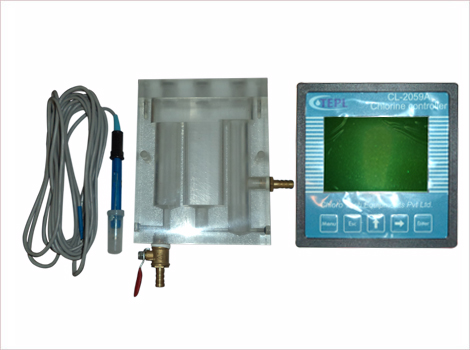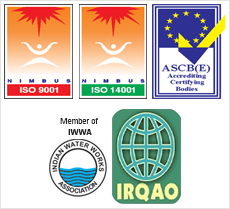
Reliable, economical chlorine control
The Hach CL17 Chlorine Analyzer uses colorimetric DPD chemistry to continuously monitor water for free or total residual chlorine. This low-cost analyzer provides a dependable and economical alternative to instruments that rely on costly electrodes or complex procedures. Unaffected by even large swings of pH, the CL17 performs an analysis every 2.5 minutes, 24 hours a day.
The CL17 offers both an alarm for manual chlorine feed control and a 4-20 mA output for automatic control of chlorine feed pumps for drinking water, wastewater and other water applications. Set for manual control, the instrument notifies the operator of out-of-limit chlorine levels - and allows manual intervention in the disinfection process as needed. The CL17 can be set for automatic control of chlorine feed pumps using one of two methods:
On-Off Control - Which turns the feed pumps on when chlorine levels fall too low for disinfection and off when levels rise above a pre-set limit.
Proportional Control – Which control the amount of chlorine in proportion to the strength of the CL17’s output signal. This done through the REC MIN and REC MAX keys. For automatic operation, the CL17 has one output control with a range of 4-20 MA, programmable over any portion of the instrument’s 0-5 mg/L range.
The unit is housed in an abs plastic case that is lightweight, shatterproof and corrosion resistant. The case includes built-in mourting bracket that simplify installation. Two windows clearly show chlorine measurements, alarms and reagent levels. A hinged door allows quick access to internal components.
The CL17 is designed to operator continuously for up to 30 days without replacing reagents or cleaning the sample cell. Because of its low reagent use, low maintenance requirement and its ability to prevent overfeeding, the CL17 is exceptionally cost-efficient.
Applications – Water, Wastewater and more
For drinking water application, the CL17 can be used to monitor the raw water stage to facilitate preoxidation, disinfection and the control of taste and odor problems. It can also be used at the finished Water stage, where residual chlorine levels must be maintained during the distribution phase. For wastewater application, the CL17 has large tubing and fitting along with a self Cleaning By-Pass Y-Strainer Kit to ensure continuous operation without clogging.
Because it can be used to monitor disinfection – and help prevent biological build-up - the CL17 is also ideal for application involving chemical or industrial process or feed water (e.g., textile and paper mills), heating and cooling water or food and beverage application. In systems using reverse cellulose acetate membranes through continuous monitoring of chlorine.
Fast, dependable operation
The CL17’s internal pump, seal-free mixer and compact colorimeter combine to deliver reliable, low-maintenance operation –around the clock, seven days a week. The instrument’s easy-to-clean sample cell and quick-access reagent chamber allow users to perform routine maintenance in 15 minutes or less per month (difficult sample may require more frequent cleaning). The CL17 is equipped with self testing diagnostics and alarms that activate in the event of system problems or shut-down.
Principle of operation
The CL 17 Chlorine Analyzer consists of five main components – a liner peristaltic pump (A); menu-driven LCD display that presents easy-to-read, scrolling messages explaining system status and operation (B); a Calorimeter with seal –free, solid-state mixing system* that includes a self –cleaning stir bar (C); and a one-month supply of reagents (D); all housed in a corrosion-resistant ABS, IP62 plastic case.
The liner peristaltic pump precisely control the volume of incoming sample and reagents. The first sample is used to establish a zero reference point by measuring blank absorbance and turbidity before the chlorine measurement is taken. Indicator and buffer reagents are added, a magnetic stirrer mixes the solution, and color development takes place. A compact colorimeter measures the light transmitted through the sample and compares the resulting color intensity to a reference standard.
The sample cell is then flushed with new sample, allowing the cycle to repeat itself every 2.5 minutes. An LED alarm can signal an out-of-limit sample concentration. The CL17’s output can also be used to trigger external chlorine feed pump, which automatically adjust chlorine injected into the system.
Method of analysis
The CL17 Chlorine Analyzer uses an aqueous buffered Colorimetric Indicator - N,N-diethyl p-phenylenediamine (DPD) –to determine levels of chlorine DPD turns a magenta color in response to the amount of free residual chlorine (as hypochlorous acid of hypochlorite ion). This reactions takes place at a buffered ph of 6.3 to 6.6 by simply changing reagents (free residual chlorine plus mono-di-and trichloramines). This is done by adding potassium iodide to iodine, whish then oxidizes the DPD indicator to the magenta color at a buffered pH of 5.1.
Range
0 to 5 mg/L free or total residual chlorine
Accuracy
+ 5% mg/L free or total residual chlorine
Precision
+ 5% or +0.035 mg/L as CL2, whichever is greater
Minimum Detection Limit
0.035 mg/L
Cycle time
One complete sample analysis every 2-1/2 minutes
Sample Conditioning
Inlet Pressure
1 to 75 psig
Sample Flow Required
200 mL per minute minimum flow rate required
Sample Temperature Range
5oC to 40oC
Operating Temperature
5oC to 40oC
Rating Maximum Humidity
90% at 40oC
Interferences
Other oxidizing agents such as bromide, chlorine dioxide, permanganate and ozone will cause a positive interference. Hexavalent chromium will cause a positive interface: 1mg/L Cr6+ = approximately 0.02 mg/l as cl2
Hardness must not exceed 1,000 mg/L as CaCO3
Recorder Outputs
One 4-20mA with an output span programmable over any portion of the 0 to 5 mg/L range
130 V isolation from earth ground
Alarms
Two alarms selectable for sample concentration alarm, analyzer system warning or analyzer system shut-down alarm; each is equipped with an SPDT relay with contacts rated for 5A resistive load at 230 VAC
Optional External Outputs
Aqua Trend Network interface
Power
100-115/230 VAC 50/60 Hz (switch selectable), 90 VA maximum
Drain Connection
1/2- inch ID flexible hose
Air Purge (optional)
1/4 –inch OD tube, quick-disconnect fitting, o.1 cfm instrument quality an at 20 psig maximum
Certification
CE approved
ETL listed to UL 1262
ETL certified to CSA 22.2 No. 142
Enclosure
ABC plastic, IP62 enclosure rating with two clear polycarbonate windows
Dimensions
Approximately 16.5” tall, 12.5” wide, 7” deep
Mounting
Wall mount

